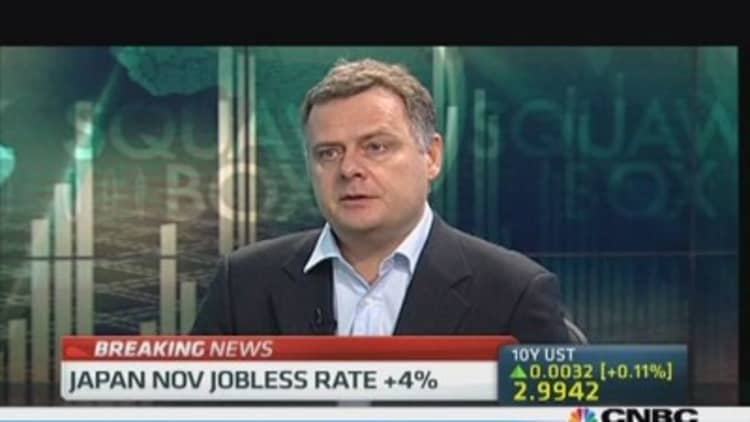The Tokyo Stock Exchange finished the trading year Monday with its best gains for over 40 years. The Nikkei 225 Index has appreciated nearly 57 percent in the year since Prime Minister Shinzo Abe launched his economic overhaul and the central bank embarked on its aggressive monetary easing.
The stock exchange - which is closed on Tuesday and reopens on January 6 - ticked higher by 0.7 percent to finish the year at 16,291.31 points. The index hit a new six-year closing high for the seventh straight session and posted a nine-day winning streak, its longest since 2009. The gain of 56.72 percent is the bourse's biggest since 1972 and better than a recent rise of 40.52 percent in 2005.
(Read More: Nikkei closes out 2013 up 57%; rest of Asia rangebound)
Since his tenure began in December 2012, Abe has unveiled a detailed plan, known as "Abenomics", which aims to lift the country out of its economic rut. Gross domestic product (GDP) growth has barely breached 2 percent over the last decade, deflation has plagued the country for 15 years and its debt-to-GDP ratio currently stands at 175 percent.
The Bank of Japan, in accordance with Abe's wishes, has promised to pump liquidity into the economy at a pace even faster than the U.S. Federal Reserve. Changes to fiscal policy have also been announced, as well as the so-called "third arrow" of structural reforms.
This extra liquidity, via the quantitative easing (QE) program, has helped to drive down the price of the Japanese yen which hit a new five-year low on Monday of 105.41 against the greenback. The currency has fallen nearly 22 percent against the dollar since the start of January.
(Read More: Japan inflation at fresh five-year high in November)
The knock-on effect of a weaker yen has been a boost for the country's exporters, which has in turn led to higher share prices. Companies that saw the biggest benefit included Mazda Motor Corp, with a rise of 213 percent. Telecom firm Softbank saw a gain of 193 percent and Fuji Heavy Industries, which makes Subaru vehicles, clocked gains of 160 percent.

Prime Minister Shinzo Abe marked the occasion by visiting the Tokyo Stock Exchange on Monday at its year-end party, and spoke in front of an audience including company executives and the general public.
"Next year will go well. With this thought, I want to do my best. Next year too, Abenomics is a buy," he said, according to the Dow Jones newswires.
(Read More: China and Japantrading goods and war threats)
Abe is not the only one that's seeing more potential upside for the index. Commodities investor Dennis Gartman said in his daily research note on Monday that a new bull run has started in Japanese stocks, which has more "staying power" than the stock gains seen in the 1980s.
Meanwhile, U.K. economist Gerard Lyons took to the social media site Twitter o Monday, giving his prediction for 2014. He indicated that the Nikkei could have another "strong year", with the index still well below its 38,915-point peak seen at the end of 1989.
— CNBC.com's Matt Clinch. Follow him on Twitter @mattclinch81


